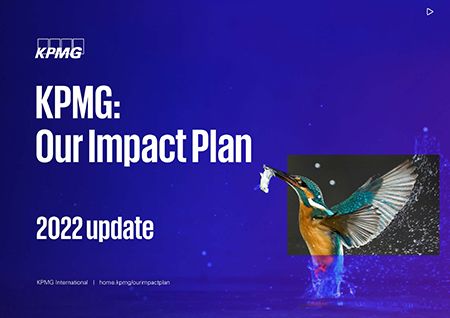Governance
Our Purpose and Values lie at the heart of the way we do things. To do the right thing, the right way, always.
Our Values represent what we believe in, and what’s important to us as an organization. If we can’t measure it, we can’t hold ourselves accountable for change and it’s critical that we continue to put our words into action. By being transparent and building on our progress we’re accelerating toward a more sustainable future.
Our commitments

Our commitments
- Act lawfully, ethically and in the public interest
- Work against corruption in all its forms, including extortion and bribery
KPMG has a strong governance structure for overseeing our activities, setting policies and aligning our strategy with our Purpose. KPMG International Limited acts as the coordinating entity for the overall benefit of the KPMG global organization. Its governance bodies are comprised of the Global Council, the Global Board, the Global Management Team (GMT) and Global Steering Groups.
The Global Board is the principal governance and oversight body of KPMG International, currently consisting of 24 members from diverse geographies that reflect KPMG’s global presence. The key responsibilities of the Global Board include approving strategy, protecting and enhancing the KPMG brand and reputation, overseeing the GMT and approving significant policies with which KPMG firms must comply. It also approves the admittance or termination of KPMG firms as members of our global organization. Find out more about our Global Governance in our Global Transparency Report 2021.
The tenure of our Global Chairman and CEO is limited to two terms of 4 years, while our Regional Chairmens’ terms on the Global Board are limited to their term of office in their regional role. Tenure for our other Global Board members is 2 years, with members eligible to be appointed for one or more additional terms. All members of the Global Board are executive members; it has no independent members.
Consistent with KPMG’s global policies, all personnel, including Global Board members, are required to comply with detailed policies on conflicts of interest and auditor independence, as well as KPMG’s Global Code of Conduct, which includes specific additional responsibilities for leaders.
Global Board members, like all our people, are prohibited from acting as the director or officer (including company secretary) of any non-KPMG entity except for: a non-profit that is not an audit or assurance client; an entity established for personal family reasons that is not a client; or an appointment made in the normal course of conducting restructuring engagements.
Global Board members have a broad range of economic and social competencies. Board members have either economic/finance-related degrees and/or accounting qualifications and all have experience in running national KPMG practices which entails consideration of economic, social and environmental issues. Many Global Board members are involved in senior roles with non-profit organizations in areas such as education, and inclusion and diversity, as well as in national and international professional bodies and business associations. Some Global Board members have environmental competencies.
The Global Board receives regular updates and education on economic, environmental and social issues as part of its role in considering and approving KPMG International’s various significant projects in these areas, many of which have been outlined here in Our Impact Plan.
There are four female Global Board members and five members of the Global Board that identify as members of underrepresented social groups.
Associating with the right clients and engagements
Our global client and engagement acceptance and continuance processes and policies help us identify and evaluate potential risks, ethics, independence, or conflicts of interest issues prior to accepting or continuing a client relationship or performing a specific engagement. KPMG firms are required to evaluate whether to accept or continue a client relationship or perform a specific engagement. Where client or engagement acceptance or continuance decisions pose significant risks, additional approvals are required. Read more in our Global Transparency Report 2021.
Setting the highest standards of ethical conduct
At KPMG, we know that trust is earned by doing the right thing. Consistent with being signatories to the UN Global Compact, we work against corruption in all its forms, including extortion and bribery. We’re committed to the highest standards of personal and professional behavior in everything we do. Ethics and integrity are core to who we are and everyone at KPMG is held to this promise of excellence.
Our Global Code of Conduct outlines the responsibilities all KPMG people have to each other, our clients and the public. It shows how our Purpose and Values inspire our greatest aspirations and guide all our behaviors and actions. It defines what it means to work at and be part of KPMG, as well as our individual and collective responsibilities.
In our Global Code of Conduct, which we regularly review and update, we clearly state that we don’t tolerate illegal or unethical behavior within KPMG or from clients or suppliers or public officials with whom we work. Bribery and corruption are unethical, even in situations where it might not be considered illegal in a particular jurisdiction.
All KPMG firms are required to have processes to assess prospective clients, sub-contractors and suppliers in relation to bribery and corruption. KPMG firms must also assess their bribery and corruption environment annually and establish and maintain processes to monitor, manage and control the interactions of the firm, its personnel and its agents with government entities and government officials, in order to ensure compliance with applicable law and regulation and to maintain public trust. Find out more about KPMG International’s position on bribery and corruption here.
KPMG International develops Code of Conduct training for everyone at KPMG and everyone is required to confirm their understanding of, and compliance with, the Code of Conduct on joining KPMG and annually after that. KPMG firms are required to monitor our people’s completion of this training, as well as the completion of training on bribery and compliance with laws, regulations and professional standards. Any individuals contracted to provide services to KPMG firms should also undertake applicable ethics training.
Additionally, KPMG firms and professional accountants are bound by the International Code of Ethics for Professional Accountants (including International Independence Standards issued by the International Ethics Standards Board for Accountants (IESBA)). KPMG has policies and procedures to enable KPMG firms and their people to comply with these standards.
Committing to change within the organization
KPMG established a global procurement ESG working group, a planet council, a prosperity council and Heads of Our Impact Plan in all our Global Board countries, with the aim to drive progress across the commitments the global organization has made in Our Impact Plan.
Addressing modern slavery risks
Over the past year, we formed a working group to address modern slavery risks. This group includes representation from the International Office of the General Counsel, Global Procurement and Corporate Affairs, and meets monthly to focus our efforts in addressing risk and opportunities. The Committee’s work is overseen by the GMT, with regular reporting to the Global Board. Our formalized accountability structure for human rights and modern slavery will be a foundational step in increasing our maturity.
Speaking up, safely
KPMG has a comprehensive approach to monitoring and reporting any illegal or unethical acts. Our Global Code of Conduct and policies and procedures set out a clear process for anyone seeking advice or wanting to report illegal or unethical behavior, and we openly encourage a culture of speaking up without any fear of reprisal. We prohibit retaliatory behavior when our people report ethical issues, breaches or suspected breaches in good faith. KPMG firms are required to have reporting mechanisms for individuals to report any illegal or unethical acts that take place internally or externally, with clear policies on when to escalate reported incidents to Global or Regional leadership.
Supporting our speak-up culture, KPMG International has a hotline that can be used for reporting any suspected instances of unethical behavior. The service is managed by a third party and is available to all KPMG people, clients and other third parties. This is in addition to other mechanisms that may exist within our KPMG firms.
Supporting non-executive careers
In recognition of the demanding and important role that board members play in championing outstanding governance, and the challenges that they face in meeting their responsibilities, KPMG firms‘ Board Leadership Centers (BLCs) aim to help board members enhance their commitment and ability to help drive long-term sustainability and enhance stakeholder confidence. Operating in more than 40 countries and territories, KPMG firms engage with directors and business leaders through an array of BLC programs and perspectives — including the KPMG Audit Committee Institute — to help articulate their challenges and promote continuous improvement of public and private company governance. Drawing on insights from KPMG professionals and subject matter experts worldwide, the BLC delivers practical thought leadership — on risk and strategy, talent and technology, globalization and compliance, financial reporting and audit quality and more — all through a board lens. An example of the support and insight the BLC provides can be found here.

